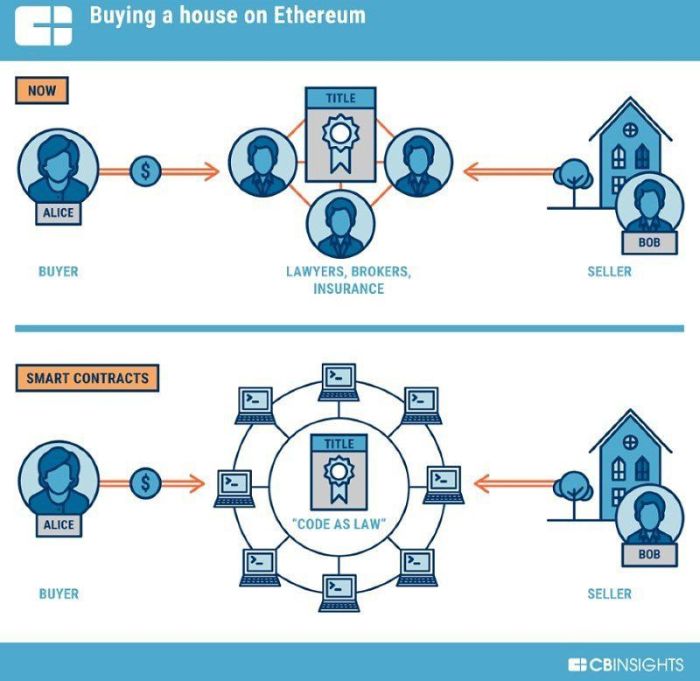Ethereum smart contracts are the game-changers in blockchain tech. Imagine a world where contracts execute themselves seamlessly, cutting out the middleman. From real-world applications to security measures, let’s dive into the world of Ethereum smart contracts.
Introduction to Ethereum Smart Contracts

Ethereum smart contracts are self-executing contracts with the terms of the agreement directly written into code. These contracts run on the Ethereum blockchain, eliminating the need for intermediaries and providing transparency and security.
Smart contracts on Ethereum function based on predefined conditions, automatically executing actions when these conditions are met. This automation ensures trustless transactions and reduces the risk of fraud.
Real-World Applications of Ethereum Smart Contracts
Ethereum smart contracts have a wide range of real-world applications, including:
- Decentralized Finance (DeFi): Smart contracts power DeFi platforms that offer services like lending, borrowing, and trading without the need for traditional financial institutions.
- Supply Chain Management: Smart contracts can track and verify goods at each stage of the supply chain, ensuring transparency and preventing fraud.
- Voting Systems: Smart contracts can be used to create secure and transparent voting systems, reducing the risk of manipulation.
Importance of Ethereum Smart Contracts in the Blockchain Ecosystem
Ethereum smart contracts play a crucial role in the blockchain ecosystem by:
- Enhancing Security: Smart contracts reduce the risk of fraud and tampering by automating transactions based on predefined rules.
- Increasing Efficiency: By eliminating intermediaries, smart contracts streamline processes and reduce costs associated with traditional contracts.
- Promoting Innovation: The versatility of smart contracts allows for the creation of new decentralized applications (DApps) that can revolutionize various industries.
Ethereum Smart Contract Development

Developing smart contracts on the Ethereum platform involves writing code that defines the rules and logic of the contract. These contracts are then deployed to the Ethereum blockchain, where they can be executed automatically when certain conditions are met.
Programming Languages for Ethereum Smart Contract Development
- Solidity: Solidity is the most commonly used programming language for Ethereum smart contract development. It is a high-level language designed specifically for writing smart contracts on the Ethereum platform.
- Vyper: Vyper is another programming language that can be used for Ethereum smart contract development. It is designed to be more secure and easier to audit than Solidity.
Tools and Frameworks for Ethereum Smart Contract Developers
- Truffle: Truffle is a popular development framework for Ethereum that provides a suite of tools for smart contract development, testing, and deployment.
- Remix: Remix is an online IDE for Ethereum smart contract development. It allows developers to write, test, and deploy smart contracts directly from their web browser.
- Ganache: Ganache is a personal blockchain for Ethereum development that allows developers to test their smart contracts in a simulated environment before deploying them to the main network.
Ethereum Smart Contract Security
When it comes to Ethereum smart contracts, security is paramount to protect the assets and data involved. Ensuring that smart contracts are secure from vulnerabilities is crucial in maintaining trust and integrity within the blockchain ecosystem.
Common Security Vulnerabilities
- Reentrancy Attacks: This vulnerability allows an attacker to repeatedly call a function before the previous calls are completed, potentially draining funds or causing other issues.
- Unchecked External Calls: If external calls are not properly validated, malicious code can be executed, leading to unauthorized access or manipulation of data.
- Integer Overflow and Underflow: Improper handling of arithmetic operations can result in unexpected behavior, such as the manipulation of balances or the creation of tokens out of thin air.
Best Practices for Enhancing Security
- Use Standard Libraries: Utilize well-tested libraries to reduce the risk of vulnerabilities.
- Implement Access Controls: Restrict access to sensitive functions and data to prevent unauthorized actions.
- Perform Code Reviews: Have multiple developers review the code to catch potential flaws and improve overall quality.
Importance of Auditing Smart Contracts
Auditing smart contracts is essential to identify and address any security vulnerabilities before deployment. By conducting thorough audits, developers can ensure that their smart contracts are robust and resilient against potential attacks, safeguarding the assets and trust of users.
Interaction with Ethereum Smart Contracts
Interacting with Ethereum smart contracts involves users executing predefined functions within the contract code to trigger specific actions on the Ethereum blockchain.
Role of Wallets in Interacting with Smart Contracts
Wallets play a crucial role in interacting with smart contracts on the Ethereum network as they serve as the interface through which users can send transactions to the contracts. These transactions are typically in the form of digital asset transfers or function calls to trigger actions within the smart contract.
Transaction Fees Associated with Ethereum Smart Contracts
When users interact with Ethereum smart contracts, they are required to pay transaction fees to compensate the network validators for processing and executing the operations. These fees are known as gas fees and are calculated based on the computational resources required to execute the smart contract functions.